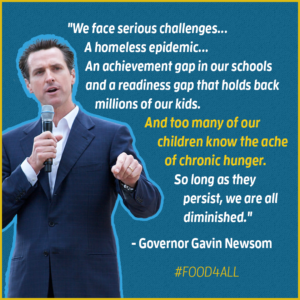The priorities of a new administration began to take shape with the release of Governor Gavin Newsom’s first budget proposal. CFPA is encouraged by the Governor’s proposals aimed at addressing inequality and poverty by improving the lives of Californians who have not shared in our state’s economic prosperity.
The annual budget is a statement of California values. These values are expressed in the decisions made about how our state allocates resources that impact all of our lives. We are heartened to see critical investments aimed at alleviating poverty and improving health. These include the expansion of Medi-Cal to undocumented young adults; investments to improve healthcare affordability; and a Working Families Tax Credit and expansion of the Earned Income Tax Credit. We look forward to working with the Administration and Legislature to ensure that strong anti-hunger investments are made in 2019.
The following are highlights from the 2019-20 Governor’s State Budget Proposal with respect to food security:
CALFRESH & FOOD DISTRIBUTION
- Elimination of SSI Cash-Out Policy—Last year’s budget made SSI recipients eligible for federal CalFresh benefits and provided one-time funding to offset any reduction in benefits due to this policy change. The Budget includes $86.7 million General Fund in 2019-20 and makes permanent the offset of the loss of food benefits for households that would otherwise experience a reduction resulting from the elimination of the SSI Cash-Out policy.
- The CalFood Program and Food Bank Capacity Improvements—The Budget provides $8 million General Fund for the CalFood program, and one-time $20 million General Fund to support infrastructure needs of California food banks’ emergency food delivery system, including capital investments needed to support food collection, storage, and distribution.
- California Statewide Automated Welfare System (CalSAWS)—As a condition of federal funding, the federal government requires the state to create a single SAWS by 2023. The current SAWS consists of three separate systems administered by the counties. The Budget includes $148.2 million ($31.2 million General Fund) in 2019-20 to design, develop, and integrate all three into one system, known as CalSAWS.
STUDENT HUNGER
- Child Nutrition Reimbursements– No major investments were made to improve the reach or quality of school meals. However, an increase of Proposition 98 General Fund will provide a 3.46 percent cost-of-living adjustment for Child Nutrition programs. We look forward to working with the Legislature and Administration to secure funding that can improve the millions of meals served to school children each day.
- College Student Hunger- The Budget proposes $15 million ongoing General Fund to assist the UC’s efforts to address student hunger and housing needs. Additionally, the Budget proposes $15 million one-time General Fund for the CSU to support its Basic Needs Initiative, which is intended to address student food insecurity and homelessness.
EARLY CHILDHOOD
The Budget contains a series of proposals for early childhood education and the well-being of our youngest Californians, including a down payment to expand Paid Family Leave; funding for universal preschool for all income-eligible four-year-old children in the state, phased in over a three-year period; and a framework to implement a comprehensive, high-quality child care system in the state with $500 million one-time General Fund to build child care infrastructure.
While the Budget proposes to reduce health disparities in early childhood through Medi-Cal screenings and a home visiting program, no new investments were made in early childhood nutrition. We look forward to working with the Legislature and the Administration to ensure that preschool and childcare expansion is hunger-free.
DEEP POVERTY
- CalWORKs Grant Increase—The Budget includes $347.6 million General Fund in 2019-20 to raise grant levels to 50 percent of the projected 2019 federal poverty level. As a result, the maximum grant level for family of three will increase from $785 to $888 per month.
- Home Visiting Services—The Budget includes $78.9 million to provide home visiting services to approximately 16,000 eligible CalWORKs families in 2019-20, with home visiting continues to serve families on an annual basis beginning in 2020-21.
- Homelessness- The Budget includes $500 million one-time General Fund for local governments to build emergency shelters and navigation centers, and $25 million General Fund ongoing to assist homeless disabled individuals in applying for disability benefits.
SAFE DRINKING WATER
- Safe Drinking Water Projects—$168.5 million for the State Water Resources Control Board to provide technical assistance, grants, and loans to public water systems in disadvantaged communities for infrastructure improvements to meet safe and affordable drinking water standards.
- Emergency Water Supplies—$10 million General Fund for the State Water Resources Control Board to address safe drinking water emergencies in disadvantaged communities.
- Safe and Affordable Drinking Water Fund—Establish a new special fund (consistent with the policy framework of SB 623 in 2017-18) with a dedicated funding source from new water, fertilizer, and dairy fees. This will enable the State Water Resources Control Board to assist disadvantaged communities in paying for the short-term and long-term costs of safe and affordable drinking water. The Budget includes $4.9 million General Fund on a one-time basis to take initial steps toward implementation of this new Safe and Affordable Drinking Water Program.
Questions? Contact Tracey Patterson at tracey@cfpa.net or 510.433.1122 ext 101.




